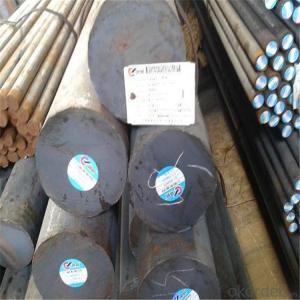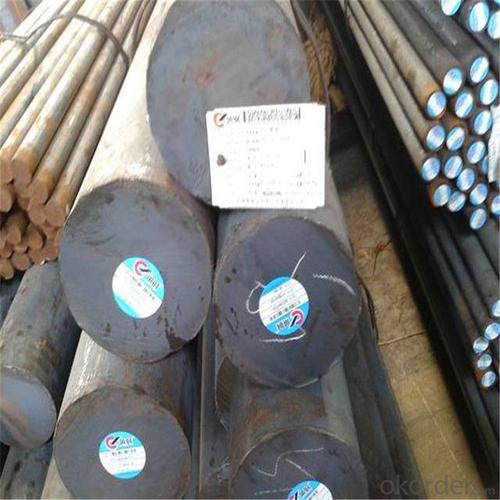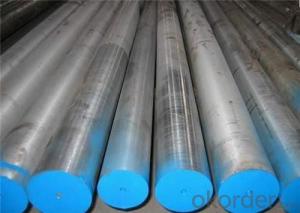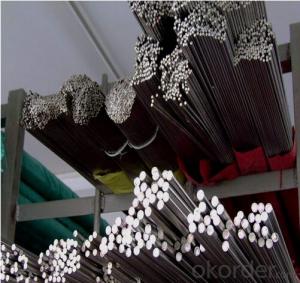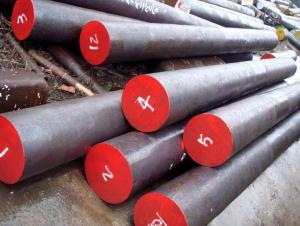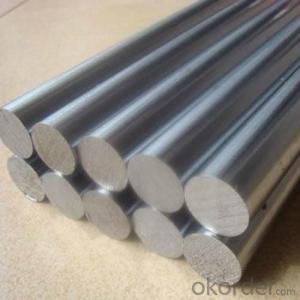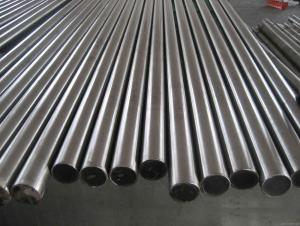High Carbon Steel Bearing Round Bar GCr15
- Loading Port:
- Shanghai
- Payment Terms:
- TT OR LC
- Min Order Qty:
- 100 m.t.
- Supply Capability:
- 50000 m.t./month
OKorder Service Pledge
OKorder Financial Service
You Might Also Like
Specification
High Carbon Steel Bearing Round Bar GCr15
Product Description of High Carbon Steel Bearing Round Bar GCr15
1. Steel grade: ASTM52100, SUJ2, 100Gr6,GCr15
2. Length: 6M-12M
3. Diameter: 16mm-300mm
4. Product range: round bar, flat bar, square bar, wire rod, sheet
5. Technique: Hot rolled, forged, cold drawn
Specification of High Carbon Steel Bearing Round Bar GCr15
Material | GCr15 | Round bar | Dia(mm) | 10-300mm |
Process | EAF + LF + VD + Forged + Heat Treatment (optional) | Length (mm) | Max 12m | |
Heat treatment | Normalized / Annealed / Quenched / tempered | Flat bar | Thickness(mm) | 8-500mm |
Delivery condition | Hot forged +Rough machined (black surface after Q/T)+ Turned (optional) | Width(mm) | 70-200mm | |
Test | Ultrasonic test according to SEP 1921-84 D/d | Length (mm) | Max 12m |
Chemical Composition of High Carbon Steel Bearing Round Bar GCr15
C | Si | Mn | Cr | Ni | Mo | P | S |
0.95~1.05 | 0.15~0.35 | 0.25~0.45 | 1.40~1.65 | ≤0.30 | ≤0.10 | ≤0.025 | ≤0.025 |
Photo Show of High Carbon Steel Bearing Round Bar GCr15
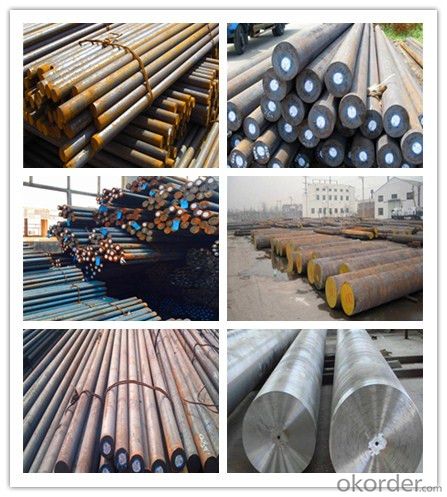
Packing and Delivery:
Packing in bundle package, or as customer's requirements.
Delivery Detail: 45 days after receiving the deposit.
Usage and Applications of High Carbon Steel Bearing Round Bar GCr15
1. Steel round bar is used in a large number of architectural and engineering structures. Or it can be used in construction of plants for the production of steel house frames, high-voltage transmission towers, bridges, vehicles, boilers, containers, ships, etc.
2. And we can use this kind of product on the performance of the mechanical parts if the demand is not very high.
3. Some special material steel round bar can be used for main shaft of steamer, hummer shank, with big section and supper force.
Company Information
CNBM International Corporation is the most important trading platform of CNBM group.
Whith its advantages, CNBM International are mainly concentrate on Cement, Glass, Iron and Steel, Ceramics industries and devotes herself for supplying high qulity series of refractories as well as technical consultancies and logistics solutions.


F A Q
1, Your advantages?
professional products inquiry, products knowledge train (for agents), smooth goods delivery, excellent customer solution proposale
2, Test & Certificate?
SGS test is available, customer inspection before shipping is welcome, third party inspection is no problem
3, Factory or Trading Company?
CNBM is a trading company but we have so many protocol factories and CNBM works as a trading department of these factories. Also CNBM is the holding company of many factories.
4, Payment Terms?
30% TT as deposit and 70% before delivery.
Irrevocable L/C at sight.
5, Trading Terms?
EXW, FOB, CIF, FFR, CNF
6, After-sale Service?
CNBM provides the services and support you need for every step of our cooperation. We're the business partner you can trust.
For any problem, please kindly contact us at any your convenient time.
We'll reply you in our first priority within 24 hours.
- Q: What is the carbon content in steel round bars?
- The amount of carbon in steel round bars varies depending on the grade and type of steel utilized, causing the carbon content in carbon steel round bars to typically range from 0.08% to 1.5%. A higher carbon content grants greater strength and hardness, albeit at the expense of weldability and ductility. The customer can specify the precise carbon content during the manufacturing process, tailoring it to their desired mechanical properties and application needs.
- Q: How do steel round bars compare to rubber round bars?
- Steel round bars and rubber round bars are two very different materials with distinct properties and applications. Steel round bars, made from hardened carbon steel, are known for their strength and durability. They have a high tensile strength and can withstand heavy loads and stress without deforming or breaking. Steel round bars are commonly used in construction, engineering, and manufacturing industries for structural support, reinforcement, and various mechanical applications. They are also highly resistant to heat and corrosion, making them suitable for applications in extreme conditions. On the other hand, rubber round bars are made from synthetic or natural rubber compounds. Rubber round bars offer unique advantages such as flexibility, elasticity, and vibration dampening properties. They are commonly used in applications where shock absorption, noise reduction, or sealing properties are required. Rubber round bars find applications in automotive industries, machinery mounts, conveyor systems, and various other industrial applications where their unique properties are beneficial. While steel round bars offer exceptional strength and rigidity, rubber round bars provide flexibility and vibration dampening capabilities. The choice between steel and rubber round bars primarily depends on the specific requirements of the application. If the application demands high strength and durability, steel round bars are the preferred choice. Conversely, if the application requires flexibility, elasticity, or vibration dampening, rubber round bars are more suitable. In summary, steel round bars and rubber round bars have different properties and applications. Steel round bars offer strength and durability, while rubber round bars provide flexibility and vibration dampening properties. The choice between the two depends on the specific requirements of the application.
- Q: What are the different types of steel round bars used in the automotive steering systems?
- There are several types of steel round bars used in automotive steering systems, including carbon steel, alloy steel, and stainless steel. Carbon steel round bars are commonly used due to their affordability and high strength properties. Alloy steel round bars are used when higher strength and durability are required, as they have additional alloying elements such as chromium, nickel, and molybdenum. Stainless steel round bars are preferred for their corrosion resistance properties, making them suitable for steering components exposed to harsh environments or moisture.
- Q: What are the different testing methods used for steel round bars?
- Steel round bars undergo various testing methods to guarantee their quality and suitability for different applications. These methods encompass: 1. Visual Inspection: In this preliminary step, the bars are visually assessed for any discernible defects, such as cracks, surface irregularities, or incorrect dimensions. 2. Dimensional checks: To verify their diameter, length, and straightness, steel round bars are subject to dimensional scrutiny. Accurate measurements are imperative to meet specified requirements. 3. Ultrasonic Testing: Internal defects like cracks, voids, or inclusions are detected by passing ultrasonic waves through the round bars. This method identifies potential weaknesses that could compromise the bars' structural integrity. 4. Magnetic Particle Inspection: By utilizing a magnetic field and magnetic particles, this method identifies surface and near-surface defects like cracks, seams, or laps. It is especially advantageous for ferromagnetic materials like steel. 5. Dye Penetrant Inspection: This technique involves applying a colored dye to the round bars' surface and subsequently wiping it off. The dye seeps into any surface cracks or defects, making them visible under ultraviolet light. 6. Hardness Testing: To gauge the hardness of steel round bars, hardness testing is conducted using methods like Rockwell or Brinell scales. It assists in determining the material's ability to withstand external forces and ensures compliance with required hardness specifications. 7. Tensile Testing: This test measures the maximum load a steel round bar can bear before fracturing, providing insight into the material's strength and ductility. 8. Chemical Analysis: Chemical analysis is performed to ascertain the composition of the steel round bars, including the presence of elements like carbon, manganese, sulfur, phosphorus, and others. It guarantees adherence to the required chemical composition standards. These testing methods are vital in ensuring that steel round bars meet industry standards and customer requirements in terms of quality, reliability, and compliance. Employing a combination of these tests is essential to ensure overall quality and performance in various applications.
- Q: What are the different types of steel round bars used in the manufacturing of tools?
- There are several different types of steel round bars that are commonly used in the manufacturing of tools. Each type of steel has its own unique properties and characteristics that make it suitable for different applications. Here are some of the most common types of steel round bars used in tool manufacturing: 1. Carbon Steel Round Bars: These are the most commonly used type of steel round bars in tool manufacturing. They are known for their high strength and durability, making them ideal for heavy-duty applications. Carbon steel round bars can be further classified into low carbon, medium carbon, and high carbon steel, depending on the amount of carbon content present. 2. Alloy Steel Round Bars: Alloy steel round bars are made by adding various alloying elements such as manganese, chromium, nickel, or molybdenum to carbon steel. This results in enhanced strength, hardness, and resistance to wear and tear. Alloy steel round bars are commonly used in the manufacturing of cutting tools, drills, and gears. 3. Stainless Steel Round Bars: Stainless steel round bars are known for their corrosion resistance and high tensile strength. They are commonly used in the manufacturing of tools that require resistance to rust, such as kitchen knives, surgical instruments, and automotive components. 4. Tool Steel Round Bars: Tool steel round bars are specifically designed to be used in the manufacturing of tools, hence the name. They have high hardness, wear resistance, and toughness, making them ideal for applications such as cutting, drilling, and shaping. Tool steel round bars can be further classified into several types based on their specific properties, such as high-speed steel (HSS), cold work steel, hot work steel, and shock-resistant steel. 5. Stainless Tool Steel Round Bars: Stainless tool steel round bars combine the characteristics of stainless steel and tool steel. They offer good resistance to corrosion and wear, making them suitable for applications where both properties are required, such as in the manufacturing of molds and dies. These are just a few examples of the different types of steel round bars used in tool manufacturing. The choice of steel depends on the specific requirements of the tool and the application it will be used for.
- Q: What are the environmental impacts of steel round bar production?
- The production of steel round bars has a range of environmental consequences. Firstly, the extraction of raw materials, like iron ore and coal, necessary for steel production, results in habitat destruction, deforestation, and disruption of ecosystems. Mining activities also produce substantial amounts of waste, including tailings and waste rock, which can contaminate soil, bodies of water, and the air. Converting iron ore into steel requires significant energy consumption, primarily derived from fossil fuels. The burning of these fuels releases greenhouse gases, such as carbon dioxide and nitrogen oxides, contributing to climate change and air pollution. Furthermore, steel production emits particulate matter, sulfur dioxide, and other pollutants that can have adverse effects on human health and ecosystems. The manufacturing of steel also demands substantial water usage for cooling, cleaning, and processing. Without proper water management practices, this can lead to water scarcity and pollution. Discharging untreated or inadequately treated wastewater from steel production can contaminate nearby water sources, impacting aquatic life and potentially harming human populations that rely on these bodies of water. Additionally, the transportation of raw materials and finished steel products over long distances contributes to carbon emissions and air pollution. The energy-intensive nature of steel production and transportation further amplifies the overall environmental impacts of the industry. To mitigate these environmental impacts, the steel industry has implemented various measures. These include adopting more efficient technologies, such as recycling and waste reduction, enhancing energy efficiency, and implementing cleaner production processes. Furthermore, the industry has been prioritizing the reduction of its carbon footprint by increasing the utilization of renewable energy sources and implementing carbon capture and storage technologies. Overall, while the production of steel round bars has negative environmental implications, ongoing efforts within the industry aim to minimize these impacts and transition towards more sustainable practices.
- Q: Are steel round bars used in the automotive industry?
- Steel round bars are widely utilized in the automotive industry. They find their application in diverse areas like the production of engine components, suspension systems, chassis, and axles. Due to their exceptional strength, durability, and versatility, steel round bars are highly favored for automotive parts that demand exceptional performance and reliability. Moreover, steel's capacity to endure heavy loads and its resistance to deformation make it well-suited for critical automotive applications prioritizing safety.
- Q: Can steel round bars be used in the food processing industry?
- No, steel round bars are not typically used in the food processing industry as they can potentially contaminate the food due to their composition and surface characteristics. Food-grade materials such as stainless steel are preferred for their corrosion resistance and hygienic properties in order to maintain the integrity and safety of the food being processed.
- Q: How do steel round bars perform in high-temperature environments?
- Steel round bars generally perform well in high-temperature environments. The performance of steel round bars in high-temperature conditions can be attributed to their high melting point and excellent heat resistance properties. Steel has a relatively high melting point compared to other materials, allowing it to withstand elevated temperatures without losing its structural integrity. Furthermore, steel round bars possess excellent thermal conductivity, which allows them to dissipate heat efficiently, minimizing the risk of deformation or structural failure. This property makes steel round bars suitable for applications where heat is generated, such as in industrial processes or high-temperature equipment. In addition to its high melting point and thermal conductivity, steel also demonstrates good mechanical strength at high temperatures. It retains its load-bearing capacity and dimensional stability, ensuring that it can withstand the stresses and strains imposed on it in high-temperature environments. However, it is important to note that the performance of steel round bars in high-temperature conditions may be influenced by the specific grade of steel used. Different grades of steel have varying compositions and alloying elements which can affect their performance at elevated temperatures. It is crucial to select the appropriate grade of steel that is specifically designed for high-temperature applications to ensure optimal performance and longevity. Overall, steel round bars are a reliable and durable choice for use in high-temperature environments due to their high melting point, excellent thermal conductivity, and mechanical strength.
- Q: Are steel round bars suitable for conveyor belt applications?
- Depending on various factors, conveyor belt applications can benefit from the use of steel round bars. These bars are renowned for their strength, durability, and resistance to wear and tear, making them a viable choice for applications involving heavy loads, high speeds, or abrasive materials. One of the main advantages of utilizing steel round bars in conveyor belt applications lies in their ability to withstand heavy loads. Their strength ensures that the bars can support the weight of conveyed materials without bending or breaking. This is particularly crucial in industries where continuous transportation of large quantities of bulky or heavy materials is required. Moreover, steel round bars exhibit high resistance to wear and tear. The smooth surface of the bars reduces friction, resulting in minimal wear on the conveyor belt and prolonging its lifespan. This is especially important in applications where the conveyor belt constantly moves and comes into contact with abrasive materials, such as in the mining or construction industries. Additionally, steel round bars are capable of withstanding high speeds without compromising their structural integrity. Their high tensile strength enables them to handle the forces exerted on the conveyor belt during acceleration or deceleration. As a result, the conveyor system operates smoothly and efficiently, reducing downtime and enhancing productivity. However, it is crucial to consider the specific requirements of the conveyor belt application when selecting steel round bars. Factors such as the type of conveyed materials, the operating environment, and the specific load and speed requirements should be carefully evaluated. In certain cases, alternative materials or coatings may be necessary to enhance the performance and longevity of the conveyor system. In conclusion, steel round bars can be a suitable choice for conveyor belt applications due to their strength, durability, and resistance to wear and tear. Nonetheless, careful consideration of the specific application requirements is essential to ensure optimal performance and longevity of the conveyor system.
Send your message to us
High Carbon Steel Bearing Round Bar GCr15
- Loading Port:
- Shanghai
- Payment Terms:
- TT OR LC
- Min Order Qty:
- 100 m.t.
- Supply Capability:
- 50000 m.t./month
OKorder Service Pledge
OKorder Financial Service
Similar products
Hot products
Hot Searches
Related keywords
